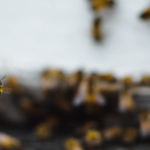Peter Nelson’s debut follows beekeepers who crisscross the country to keep American agriculture going.
The directing debut of longtime documentary cinematographer Peter Nelson, The Pollinators is predictably pleasing to look at: As with similar nature-oriented films, one can count on slo-mo closeups that catch insects in flight; panoramic views of heartland farms; and scenes of workers toiling while the faintest strip of sunlight vanishes on the horizon. But the pic is more fact-forward than its pedigree might suggest — a film about processes and practicalities in the economy of beekeeping.
Doc consumers may well feel they’ve seen enough on this topic. But Pollinators, which addresses agricultural systems shaped by American chemical companies, has very little in common with last year’s celebrated, Macedonia-set Honeyland; and its examination of threats to bees is more up-to-date than those in films (like Markus Imhoof’s More Than Honey) made back when colony collapse disorder was creating a panic in eco-aware citizens. Sober but accessible, it’s a fine primer for those unaware of bees’ crucial role in our food system.
How crucial? One of the few title cards in this no-narration film informs us that twenty billion dollars’ worth of the American economy depends on pollinators, who are required to help flowering crops produce food. Elsewhere, someone says that one out of every three bites of food Americans eat only exists because a bee pollinated a plant somewhere. As for non-pollinated crops, one young man mockingly suggests that the companies who manufacture pesticides “figure we should eat corn, soybeans and rice” and stop fretting over fruits, nuts and everything else that tastes good; he’s the same one who’ll quip, later in the film, that the EPA caters so shamelessly to these megacorps that “I call them the CPA…Chemical Protection Agency.”
Before he gets to the reasons behind the current state of American-style agriculture, though, Nelson shows the delicate-looking operation that keeps much of it from falling apart. He spends much of his time around giant flatbed trucks that haul tens of thousands of wooden crates of bees from one farm to another, watching as workers unload them, reload them, and share information about that day’s difficulties.
It can cost a farm hundreds of thousands of dollars to rent these bees for a single growing season, and we see how the delicate timing of these deliveries puts everything in jeopardy. Many apple orchards, for instance, use chemical agents to “thin” crops, killing off small apples and letting the biggest ones grow. They do this very quickly after the plants have been pollinated; but if bees are still at work on a neighboring farm, many will be killed by chemicals drifting over in the air.
While beekeepers lament this state of affairs, scientists describe a feedback loop in which various threats to the insects — parasites, pesticides, viruses and poor nutrition — reinforce each other; unlike the mid-2000s, the mysterious colony collapse disorder now “is just one little part of the problem.”
As in a hundred other films about modern agriculture, Pollinators explains how monoculture farming — those vast fields of corn and soy — creates problems the big chemical companies conveniently sell cures for. Happily, people from journalists to celebrated chefs to common-sense farmers are (re)discovering ways to move away from synthetic pesticides, nurturing unruly-looking fields that often, coincidentally or not, give honeybees places to thrive.
Production company: Stonykill Films
Distributor: 1091 Media (Available Tuesday, June 16 on demand)
Director-Director of photography: Peter Nelson
Producers: Peter Nelson, Michael Reuter
Executive producer: Sally Roy
Editor: Michael Reuter
Composer: Douglas J. Cuomo
93 minutes


